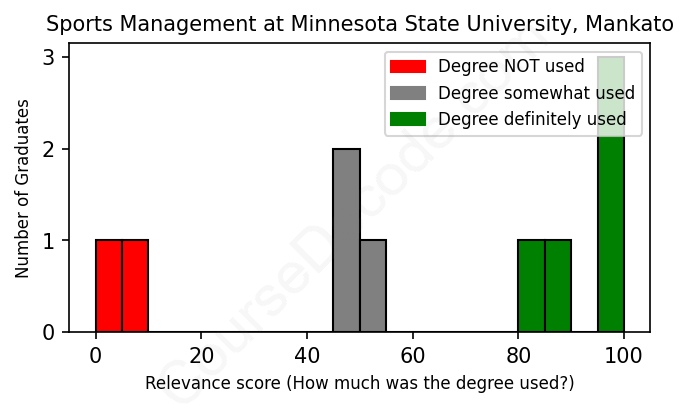
First, some facts. Of the Sports Management graduates from Minnesota State University, Mankato we've analyzed , here's how many have used (or NOT used) their degree in their career:

These are estimates based on AI analysis of 10 LinkedIn profiles (see below).
The verdict? Below average. Overall, with an average relevance score of 61%, Sports Management graduates from Minnesota State University, Mankato have a lower likelihood (-6%) of finding work in this field compared to the average graduate across all fields:
And for comparison, here's the chart for all profiles we've looked at across all degrees.
Also, after graduating, 40% of these graduates have pursued further education other than another Bachelor's degree (such as a Masters degree or other), compared to the average across all profiles of 35%. This suggests you may need more than just a Bachelors degree to be competitive as a Sports Management graduate.
See the details:
|
Relevance score: 45% We think this person has gone into a career only somewhat relevant to their degree. We think this person has gone into a career only somewhat relevant to their degree.
DEGREE INFOGraduated in 2011 from Minnesota State University, Mankato with a Bachelor's degree in Sports Management. No other secondary education since. JOB HISTORY SINCE GRADUATIONSecurity Guard Kronke Sports and Entertainment Nov 2017 - Jun 2018 Delivery Driver  Elite Brands of Colorado Nov 2018 - Jun 2019 Actor  Maximum Talent Agency Sep 2018 - Present ABOUTExperienced Actor with a demonstrated history of working in the staffing and recruiting industry. Skilled in Hospitality Industry, Travel & Tourism, Acting, Customer Service, and Sports Management. Strong media and communication professional with a Bachelor's degree focused in Sport and Fitness Administration/Management from Minnesota State University, Mankato. |
The top 10 most common jobs done by the graduates we've analyzed (ranked most common to least) are:
After going through the job history of graduates from Minnesota State University, Mankato with a degree in Sports Management, it's clear that many of them have landed roles in coaching, team management, and sports operations. Positions like Assistant Football Coach, Women's Soccer Assistant Coach, and General Manager at various sports teams showcase a strong connection between their studies and their job roles. These positions leverage the skills learned in sports management, focusing on aspects like coaching, leadership, team dynamics, and organizational management, which are crucial for success in the sports industry.
However, not every job held by these graduates is relevant to sports management. Many have found themselves in roles that only loosely connect to their degree, like working as a Security Guard, Delivery Driver, or even Bank Teller, which don't tap into the core competencies of sports management. The trend shows that while there's a solid number of meaningful sports management careers, a significant portion of these graduates also took jobs that didn't specifically require their sports knowledge. It's a mixed bag, really; they often have great opportunities, but there’s also a fair share of unrelated positions in the mix.
Here is a visual representation of the most common words in job titles for Sports Management graduates (this is across all Sports Management graduates we've analyzed, not just those who went to Minnesota State University, Mankato):

Looking at the career trajectories of graduates from the Sports Management program at Minnesota State University, Mankato, it seems like many of them initially land positions that are fairly relevant to their studies, especially within the realm of athletics. For instance, several recent graduates snag roles as interns or assistants at colleges or sports organizations, allowing them to gain hands-on experience right after graduation. Some have also taken on coaching or operational roles in sports facilities or organizations, which offers a nice pathway to build their skills and networks in the sports industry.
However, while many grads kick off their careers in sports-related positions, not all of them stay in that lane for the long haul. There are instances where individuals transition into fields that seem unrelated, like marketing or various operational roles. For example, some have moved into corporate settings or taken jobs in retail and other service areas after their initial sports roles. As we look five to ten years down the road, it’s a mixed bag; some stay in the sports niche, climbing up to roles as coaches, coordinators, or even directors, while others seem to drift away into broader careers. So, while there’s promise for those looking to make a mark in sports, there’s also a noticeable shift for some into unrelated fields as their careers progress.
Getting a Bachelor’s degree in Sports Management at Minnesota State University, Mankato, or really anywhere, is generally considered to be on the easier side compared to some other majors. There’s a good mix of practical and theoretical coursework, and you’ll likely find that many classes involve projects, group work, and hands-on experiences, which can make things more engaging and less stressful. Of course, it still requires dedication and effort like any other program, especially if you want to stand out and really learn the material. But overall, if you're passionate about sports and stay organized, it should be a manageable experience for you!
Most commonly, in the LinkedIn profiles we've looked at, it takes people 4 years to finish a Bachelor degree in Sports Management.
Looking at the career paths of these Sports Management grads from Minnesota State University, Mankato, it seems like they’re starting off in some decent roles, but the salary potential varies quite a bit. A few of them have made their way into solid positions, like the Vice President of Operations for ETS Performance, which likely brings in a good income, while others, like the recent bank teller, are probably starting on the lower end of the pay scale. Many of the early jobs are internships and entry-level positions, which usually don’t pay much at all. Overall, it seems like with some time and experience, they could definitely climb the ladder and improve their earning potential, but for now, it looks like they’re just getting their feet wet in the industry.
Here is a visual representation of the most common words seen in the "about" section of LinkedIn profiles who have a Bachelor degree in Sports Management (this is across all Sports Management graduates we've analyzed, not just those who went to Minnesota State University, Mankato). This may or may not be useful:

Here are all colleges offering a Bachelor degree in Sports Management (ordered by the average relevance score of their Sports Management graduates, best to worst) where we have analyzed at least 10 of their graduates: